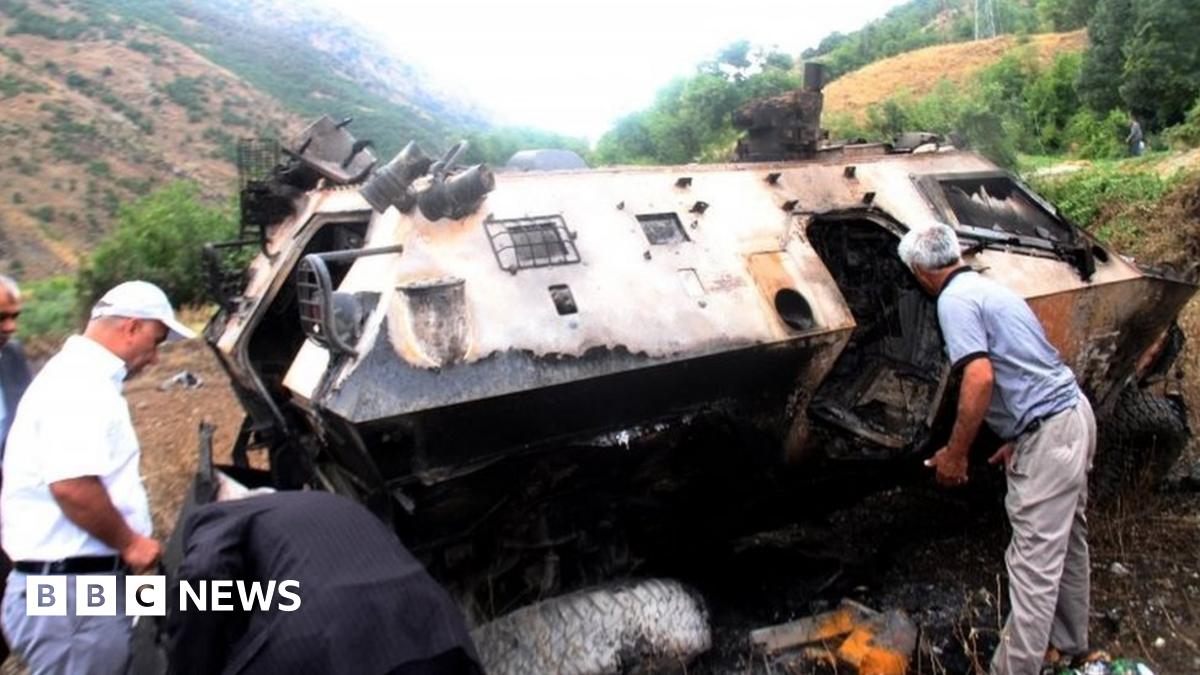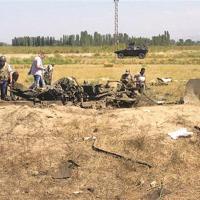Re: Prospects of a Kurdish state and what it means for Armenia
WESTWARD HO!
Editorial, 31 August 2015
Without much ado, millions of Turks living in the eastern part of
the country have been moving to the centre and further west while
several millions of Turks have left Turkey for the more promising
shores of Europe, North America and Australia. Kurds are also moving
west, but the Turks are doing so in far greater numbers.
Several months ago Dr. Suven Suk, PhD in economics and director
of independent and non-partisan think tank called Economic Policy
Research Foundation of Turkey (TEPAV), wrote in Hurriyet Daily News
that 50 years ago the population of Turkey was evenly distributed
between the west, centre, and the east.
That pattern remained unchanged until 1980 when the population
shift towards west began in earnest. By 2000 the west had 44% of the
population; the centre had 30% and the east 26%. Three years ago there
was a further shift towards the west: the latter's share increased
to almost half (49%) of the population; the centre declined from 30%
to 28% while the east shrank to 23%. Bottom line: since 1965 western
Turkey's share of the population has increased by 15%.
The two main reasons for the population shift are industrialization
and urbanization. Some 75% of Turkey's population lives in cities. As
well, Diyarbakir (Dikranagerd), Van, and Sanliurfa (Urfa), Gaziantep
(Aintab), and Kahramanmarash (Marash) are the only eastern cities
which have populations of more than 1 million. In the west Istanbul
has a population of 14,500,000, Ankara (5,200,000), Izmir (4,200,000),
Adana (2,200,000), Antalya (2,250,000), Konya (2,100,000), Bitlis,
Kocaeli, and Mersin each 1,800,000, and Kayseri (1,350,000).
Turkey has a population of close to 80 million. About 18% (14,500,000)
are Kurds. The latter estimate they make up 20% (16 million).
Non-Turks and non-Kurds are, according to the CIA World Fact Book, 7%
to 12% of the population. The majority of the Kurds live in eastern
Turkey (Western Armenia). During the recent presidential elections
they demonstrated their clout by winning about 13% of the votes
and scuttled Erdogan's plan for greater presidential powers. In big
eastern cities Kurds almost monopolized mayoral seats and administer
more than 110 municipalities.
What does the population shift mean to the future of Turkey, Turkish
Kurdistan, and to Armenian demands for Western Armenia?
If the westward migration continues, it will probably be so at a
faster pace than in the past: Eastern Turks becoming a minority would
be more eager to move west. The violence between Kurds and Turkish
army would be another incentive for Turks to leave the east.
Many Turkey experts believe the recent increased violence between
the army and the Kurds (engineered by Erdogan who, considering his
Pinocchio proclivities, should be called Erdocchio) could well result
in the president's victory in the snap elections in early November.
His AKP party would then form a single-party government at the expense
of the HDP (the mainly Kurdish party) and encourage Erdogan to impose
harsher measures against the Kurds. Thus more violence. But now
the Kurds aren't the Kurds of the 1990s. They're more sophisticated
politically, are better organized and armed. The world knows about
their plight more than it did in the past. They can also call
upon their brothers and sisters in Iraq and Syria for military and
financial help.
The emptying of Turks from the east will make state administration
there more vulnerable as Ankara tries to control millions of restive
Kurds. Turkey will probably play the autonomy card. Some Kurds will
be content while most will continue to demand independence. Turkish
leaders know that Kurds are aiming for full independence, but no
Ankara administration wants to be the one which "lost Kurdistan".
What about the Armenians and their land demands?
That's the 46 Million Dollar Question.
Certain Diaspora Armenians and Armenian organizations (the National
Congress of Western Armenians, for one--NCWA) believe that the best
way to recover some of the occupied Western Armenian lands is through
dialogue with Ankara and by waiting for Turkey's democratization. The
thesis is that as a democratic Turkey allows its citizens to know the
truth about 1915, Turks will concede to some Armenian demands. Other
Armenians believe they should help the Kurds gain independence with the
obvious promise of the return of some Western Armenia lands to Armenia
when Kurdistan is born. These lands would presumably be contiguous to
the Republic of Armenia. The guilt many Kurds feel for the Kurdish
participation in the Genocide would also help the Armenian Cause,
the second group likes to believe.
If Turkey continues its occupation of Western Armenia, the strategy
of, for example, the NCWA seems more practical. But the second, which
advocates an Armenian/Kurdish alliance, has to become proactive. Panel
discussions, cordial meetings, photo ops, recognition of the Genocide
of the Armenians by the Kurds (and the admission of their participation
in it), and goodwill will achieve only so much in building strong
bonds with the Kurds.
The second 60 Million Question is how can the Armenians assist
the Kurds in a robust manner? More intensive, organized and focused
efforts have to be made by the Armenian Diaspora to support the Kurdish
independence. Through dialogue with the Kurds Armenians have to learn
what the Kurds need and whether Armenians are in a position to provide
it. While doing so, Armenians should also obtain Kurdish commitment
for the return of certain/to be negotiated Western Armenian lands.
This all sounds like counting the eggs before they're hatched.
However, one can feed the hen before it lays the eggs and hope the
fowl will remember its benefactor after the chicks are born. Although
Britain and France did not solicit Italian help, Italians volunteered
to fight, along with the British and the French, in the Crimean War.
After the war, grateful Britain and France became godfathers to
independent Italy and discouraged Austria from obstructing the birth
of the new state. There are too many examples of such give-and-take
in international affairs to cite.
WESTWARD HO!
Editorial, 31 August 2015
Without much ado, millions of Turks living in the eastern part of
the country have been moving to the centre and further west while
several millions of Turks have left Turkey for the more promising
shores of Europe, North America and Australia. Kurds are also moving
west, but the Turks are doing so in far greater numbers.
Several months ago Dr. Suven Suk, PhD in economics and director
of independent and non-partisan think tank called Economic Policy
Research Foundation of Turkey (TEPAV), wrote in Hurriyet Daily News
that 50 years ago the population of Turkey was evenly distributed
between the west, centre, and the east.
That pattern remained unchanged until 1980 when the population
shift towards west began in earnest. By 2000 the west had 44% of the
population; the centre had 30% and the east 26%. Three years ago there
was a further shift towards the west: the latter's share increased
to almost half (49%) of the population; the centre declined from 30%
to 28% while the east shrank to 23%. Bottom line: since 1965 western
Turkey's share of the population has increased by 15%.
The two main reasons for the population shift are industrialization
and urbanization. Some 75% of Turkey's population lives in cities. As
well, Diyarbakir (Dikranagerd), Van, and Sanliurfa (Urfa), Gaziantep
(Aintab), and Kahramanmarash (Marash) are the only eastern cities
which have populations of more than 1 million. In the west Istanbul
has a population of 14,500,000, Ankara (5,200,000), Izmir (4,200,000),
Adana (2,200,000), Antalya (2,250,000), Konya (2,100,000), Bitlis,
Kocaeli, and Mersin each 1,800,000, and Kayseri (1,350,000).
Turkey has a population of close to 80 million. About 18% (14,500,000)
are Kurds. The latter estimate they make up 20% (16 million).
Non-Turks and non-Kurds are, according to the CIA World Fact Book, 7%
to 12% of the population. The majority of the Kurds live in eastern
Turkey (Western Armenia). During the recent presidential elections
they demonstrated their clout by winning about 13% of the votes
and scuttled Erdogan's plan for greater presidential powers. In big
eastern cities Kurds almost monopolized mayoral seats and administer
more than 110 municipalities.
What does the population shift mean to the future of Turkey, Turkish
Kurdistan, and to Armenian demands for Western Armenia?
If the westward migration continues, it will probably be so at a
faster pace than in the past: Eastern Turks becoming a minority would
be more eager to move west. The violence between Kurds and Turkish
army would be another incentive for Turks to leave the east.
Many Turkey experts believe the recent increased violence between
the army and the Kurds (engineered by Erdogan who, considering his
Pinocchio proclivities, should be called Erdocchio) could well result
in the president's victory in the snap elections in early November.
His AKP party would then form a single-party government at the expense
of the HDP (the mainly Kurdish party) and encourage Erdogan to impose
harsher measures against the Kurds. Thus more violence. But now
the Kurds aren't the Kurds of the 1990s. They're more sophisticated
politically, are better organized and armed. The world knows about
their plight more than it did in the past. They can also call
upon their brothers and sisters in Iraq and Syria for military and
financial help.
The emptying of Turks from the east will make state administration
there more vulnerable as Ankara tries to control millions of restive
Kurds. Turkey will probably play the autonomy card. Some Kurds will
be content while most will continue to demand independence. Turkish
leaders know that Kurds are aiming for full independence, but no
Ankara administration wants to be the one which "lost Kurdistan".
What about the Armenians and their land demands?
That's the 46 Million Dollar Question.
Certain Diaspora Armenians and Armenian organizations (the National
Congress of Western Armenians, for one--NCWA) believe that the best
way to recover some of the occupied Western Armenian lands is through
dialogue with Ankara and by waiting for Turkey's democratization. The
thesis is that as a democratic Turkey allows its citizens to know the
truth about 1915, Turks will concede to some Armenian demands. Other
Armenians believe they should help the Kurds gain independence with the
obvious promise of the return of some Western Armenia lands to Armenia
when Kurdistan is born. These lands would presumably be contiguous to
the Republic of Armenia. The guilt many Kurds feel for the Kurdish
participation in the Genocide would also help the Armenian Cause,
the second group likes to believe.
If Turkey continues its occupation of Western Armenia, the strategy
of, for example, the NCWA seems more practical. But the second, which
advocates an Armenian/Kurdish alliance, has to become proactive. Panel
discussions, cordial meetings, photo ops, recognition of the Genocide
of the Armenians by the Kurds (and the admission of their participation
in it), and goodwill will achieve only so much in building strong
bonds with the Kurds.
The second 60 Million Question is how can the Armenians assist
the Kurds in a robust manner? More intensive, organized and focused
efforts have to be made by the Armenian Diaspora to support the Kurdish
independence. Through dialogue with the Kurds Armenians have to learn
what the Kurds need and whether Armenians are in a position to provide
it. While doing so, Armenians should also obtain Kurdish commitment
for the return of certain/to be negotiated Western Armenian lands.
This all sounds like counting the eggs before they're hatched.
However, one can feed the hen before it lays the eggs and hope the
fowl will remember its benefactor after the chicks are born. Although
Britain and France did not solicit Italian help, Italians volunteered
to fight, along with the British and the French, in the Crimean War.
After the war, grateful Britain and France became godfathers to
independent Italy and discouraged Austria from obstructing the birth
of the new state. There are too many examples of such give-and-take
in international affairs to cite.








Comment